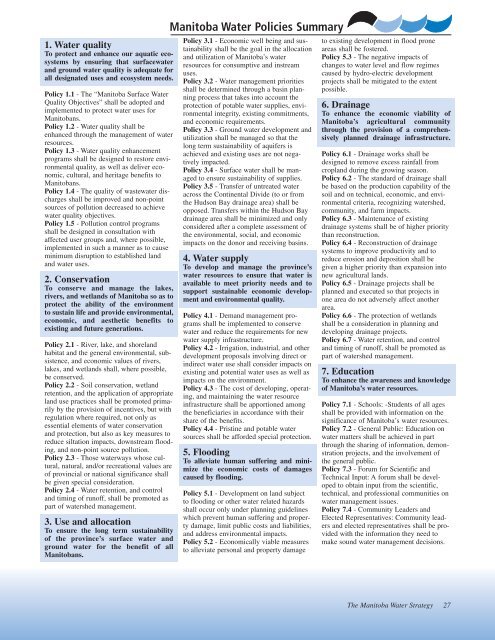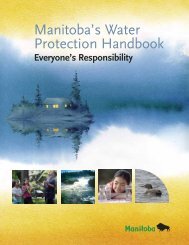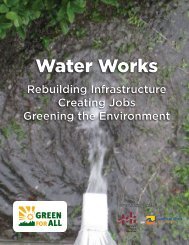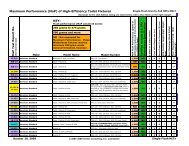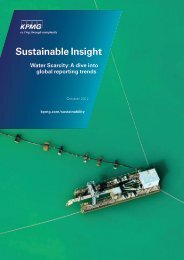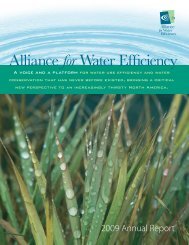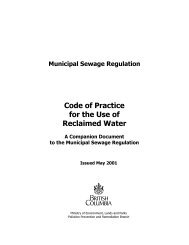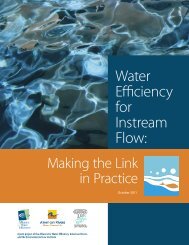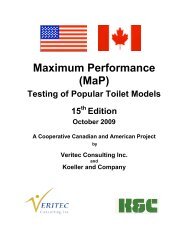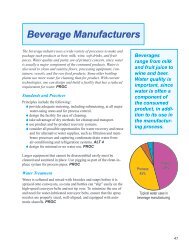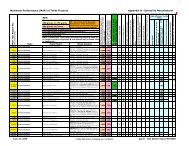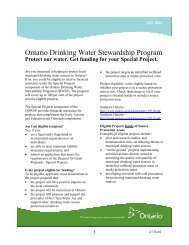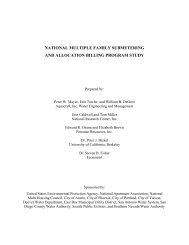The Manitoba Water Strategy - Government of Manitoba
The Manitoba Water Strategy - Government of Manitoba
The Manitoba Water Strategy - Government of Manitoba
You also want an ePaper? Increase the reach of your titles
YUMPU automatically turns print PDFs into web optimized ePapers that Google loves.
1. <strong>Water</strong> quality<br />
To protect and enhance our aquatic ecosystems<br />
by ensuring that surfacewater<br />
and ground water quality is adequate for<br />
all designated uses and ecosystem needs.<br />
Policy 1.1 - <strong>The</strong> “<strong>Manitoba</strong> Surface <strong>Water</strong><br />
Quality Objectives” shall be adopted and<br />
implemented to protect water uses for<br />
<strong>Manitoba</strong>ns.<br />
Policy 1.2 - <strong>Water</strong> quality shall be<br />
enhanced through the management <strong>of</strong> water<br />
resources.<br />
Policy 1.3 - <strong>Water</strong> quality enhancement<br />
programs shall be designed to restore environmental<br />
quality, as well as deliver economic,<br />
cultural, and heritage benefits to<br />
<strong>Manitoba</strong>ns.<br />
Policy 1.4 - <strong>The</strong> quality <strong>of</strong> wastewater discharges<br />
shall be improved and non-point<br />
sources <strong>of</strong> pollution decreased to achieve<br />
water quality objectives.<br />
Policy 1.5 - Pollution control programs<br />
shall be designed in consultation with<br />
affected user groups and, where possible,<br />
implemented in such a manner as to cause<br />
minimum disruption to established land<br />
and water uses.<br />
2. Conservation<br />
To conserve and manage the lakes,<br />
rivers, and wetlands <strong>of</strong> <strong>Manitoba</strong> so as to<br />
protect the ability <strong>of</strong> the environment<br />
to sustain life and provide environmental,<br />
economic, and aesthetic benefits to<br />
existing and future generations.<br />
Policy 2.1 - River, lake, and shoreland<br />
habitat and the general environmental, subsistence,<br />
and economic values <strong>of</strong> rivers,<br />
lakes, and wetlands shall, where possible,<br />
be conserved.<br />
Policy 2.2 - Soil conservation, wetland<br />
retention, and the application <strong>of</strong> appropriate<br />
land use practices shall be promoted primarily<br />
by the provision <strong>of</strong> incentives, but with<br />
regulation where required, not only as<br />
essential elements <strong>of</strong> water conservation<br />
and protection, but also as key measures to<br />
reduce siltation impacts, downstream flooding,<br />
and non-point source pollution.<br />
Policy 2.3 - Those waterways whose cultural,<br />
natural, and/or recreational values are<br />
<strong>of</strong> provincial or national significance shall<br />
be given special consideration.<br />
Policy 2.4 - <strong>Water</strong> retention, and control<br />
and timing <strong>of</strong> run<strong>of</strong>f, shall be promoted as<br />
part <strong>of</strong> watershed management.<br />
3. Use and allocation<br />
To ensure the long term sustainability<br />
<strong>of</strong> the province’s surface water and<br />
ground water for the benefit <strong>of</strong> all<br />
<strong>Manitoba</strong>ns.<br />
<strong>Manitoba</strong> <strong>Water</strong> Policies Summary<br />
Policy 3.1 - Economic well being and sustainability<br />
shall be the goal in the allocation<br />
and utilization <strong>of</strong> <strong>Manitoba</strong>’s water<br />
resources for consumptive and instream<br />
uses.<br />
Policy 3.2 - <strong>Water</strong> management priorities<br />
shall be determined through a basin planning<br />
process that takes into account the<br />
protection <strong>of</strong> potable water supplies, environmental<br />
integrity, existing commitments,<br />
and economic requirements.<br />
Policy 3.3 - Ground water development and<br />
utilization shall be managed so that the<br />
long term sustainability <strong>of</strong> aquifers is<br />
achieved and existing uses are not negatively<br />
impacted.<br />
Policy 3.4 - Surface water shall be managed<br />
to ensure sustainability <strong>of</strong> supplies.<br />
Policy 3.5 - Transfer <strong>of</strong> untreated water<br />
across the Continental Divide (to or from<br />
the Hudson Bay drainage area) shall be<br />
opposed. Transfers within the Hudson Bay<br />
drainage area shall be minimized and only<br />
considered after a complete assessment <strong>of</strong><br />
the environmental, social, and economic<br />
impacts on the donor and receiving basins.<br />
4. <strong>Water</strong> supply<br />
To develop and manage the province’s<br />
water resources to ensure that water is<br />
available to meet priority needs and to<br />
support sustainable economic development<br />
and environmental quality.<br />
Policy 4.1 - Demand management programs<br />
shall be implemented to conserve<br />
water and reduce the requirements for new<br />
water supply infrastructure.<br />
Policy 4.2 - Irrigation, industrial, and other<br />
development proposals involving direct or<br />
indirect water use shall consider impacts on<br />
existing and potential water uses as well as<br />
impacts on the environment.<br />
Policy 4.3 - <strong>The</strong> cost <strong>of</strong> developing, operating,<br />
and maintaining the water resource<br />
infrastructure shall be apportioned among<br />
the beneficiaries in accordance with their<br />
share <strong>of</strong> the benefits.<br />
Policy 4.4 - Pristine and potable water<br />
sources shall be afforded special protection.<br />
5. Flooding<br />
To alleviate human suffering and minimize<br />
the economic costs <strong>of</strong> damages<br />
caused by flooding.<br />
Policy 5.1 - Development on land subject<br />
to flooding or other water related hazards<br />
shall occur only under planning guidelines<br />
which prevent human suffering and property<br />
damage, limit public costs and liabilities,<br />
and address environmental impacts.<br />
Policy 5.2 - Economically viable measures<br />
to alleviate personal and property damage<br />
to existing development in flood prone<br />
areas shall be fostered.<br />
Policy 5.3 - <strong>The</strong> negative impacts <strong>of</strong><br />
changes to water level and flow regimes<br />
caused by hydro-electric development<br />
projects shall be mitigated to the extent<br />
possible.<br />
6. Drainage<br />
To enhance the economic viability <strong>of</strong><br />
<strong>Manitoba</strong>’s agricultural community<br />
through the provision <strong>of</strong> a comprehensively<br />
planned drainage infrastructure.<br />
Policy 6.1 - Drainage works shall be<br />
designed to remove excess rainfall from<br />
cropland during the growing season.<br />
Policy 6.2 - <strong>The</strong> standard <strong>of</strong> drainage shall<br />
be based on the production capability <strong>of</strong> the<br />
soil and on technical, economic, and environmental<br />
criteria, recognizing watershed,<br />
community, and farm impacts.<br />
Policy 6.3 - Maintenance <strong>of</strong> existing<br />
drainage systems shall be <strong>of</strong> higher priority<br />
than reconstruction.<br />
Policy 6.4 - Reconstruction <strong>of</strong> drainage<br />
systems to improve productivity and to<br />
reduce erosion and deposition shall be<br />
given a higher priority than expansion into<br />
new agricultural lands.<br />
Policy 6.5 - Drainage projects shall be<br />
planned and executed so that projects in<br />
one area do not adversely affect another<br />
area.<br />
Policy 6.6 - <strong>The</strong> protection <strong>of</strong> wetlands<br />
shall be a consideration in planning and<br />
developing drainage projects.<br />
Policy 6.7 - <strong>Water</strong> retention, and control<br />
and timing <strong>of</strong> run<strong>of</strong>f, shall be promoted as<br />
part <strong>of</strong> watershed management.<br />
7. Education<br />
To enhance the awareness and knowledge<br />
<strong>of</strong> <strong>Manitoba</strong>’s water resources.<br />
Policy 7.1 - Schools: -Students <strong>of</strong> all ages<br />
shall be provided with information on the<br />
significance <strong>of</strong> <strong>Manitoba</strong>’s water resources.<br />
Policy 7.2 - General Public: Education on<br />
water matters shall be achieved in part<br />
through the sharing <strong>of</strong> information, demonstration<br />
projects, and the involvement <strong>of</strong><br />
the general public.<br />
Policy 7.3 - Forum for Scientific and<br />
Technical Input: A forum shall be developed<br />
to obtain input from the scientific,<br />
technical, and pr<strong>of</strong>essional communities on<br />
water management issues.<br />
Policy 7.4 - Community Leaders and<br />
Elected Representatives: Community leaders<br />
and elected representatives shall be provided<br />
with the information they need to<br />
make sound water management decisions.<br />
<strong>The</strong> <strong>Manitoba</strong> <strong>Water</strong> <strong>Strategy</strong><br />
27


